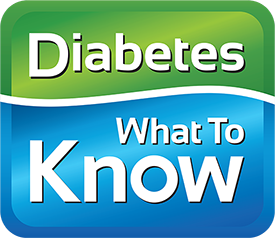By Melinda Maryniuk, MEd, RD, CDCES
After hearing a diagnosis of type 2 diabetes, one of the first questions most people have is: will this ever go away? Can it be reversed? Cured?
There is so much confusion and misinformation about type 2 diabetes – it’s time to set the record straight. Let’s review some common beliefs, whether they’re true or false, and talk about what the science shows….
“Once you have been diagnosed with type 2 diabetes, you have it forever.”
Doctors and healthcare professionals used to give those newly diagnosed with type 2 diabetes this message: “once you have it – you will always have it.” However, there are new treatment options available and research is showing that people can bring their glucose levels back into target ranges – and keep them there for a long time. The recommended term to describe this phenomenon – when diabetes seems to disappear – is diabetes “remission.” Know that this is not very common, but it can happen with very intensive therapies and weight loss. So the answer to this question is false.
“If you are diagnosed with type 1 diabetes, you have it forever.”
This is true. Type 1 diabetes is an autoimmune condition where the pancreas does not make any insulin. To replace the necessary insulin, it must be given by injection. There is no evidence at this point that type 1 diabetes can be “cured” or go into “remission.” It is true that many individuals newly diagnosed with type 1 diabetes go into what is called a “honeymoon phase.” During this phase, glucose levels are in normal ranges with only very little (or no) insulin needed. The pancreas starts producing insulin again – but only for a short time. Unfortunately, the honeymoon phase does not last.
“Diabetes reversal and remission is the same thing.”
False. Experts strongly recommend the term “remission.” “Reversal” is misleading as it implies that diabetes goes away for good. Unfortunately, diabetes can return over time, particularly if lifestyle changes aren’t maintained.
“Remission for type 2 diabetes is defined as having an A1C of less than 5.7% or a fasting glucose of less than <100 mg/dL.”
This statement is not entirely complete. An amount of time and whether or not medicines are used needs to be part of the definition. For example, if you check your blood glucose in the morning and your fasting level is always below 100 and your A1C is 5.6%, you may be on the path to remission, but you need to maintain those numbers for 6 – 12 months for your doctor to declare that your diabetes is, in fact, in remission. It is currently being debated if the definition of remission implies the use of no diabetes medicines – or if the use of only metformin is acceptable. The definition of remission (which was proposed in 2009) is being reviewed, revised, and updated by an international committee of experts. Currently, the definition of complete remission of diabetes describes that lab values (A1C and fasting glucose) have to be in normal ranges for at least one year. The new proposed definition may be revised that to say that the numbers need to be maintained for six months. Thus, the answer is false.
“If type 2 diabetes goes into “remission,” it won’t come back.”
Even if diabetes is in remission, you continue to be at risk for type 2 diabetes and will need to have annual tests (like the A1C) to see if your results are still in target. If weight starts to increase, diabetes risk will increase. Research has not followed people long enough to know exactly how long people are likely to stay in remission. Based on all this, this statement is false.
“The most common ways type 2 diabetes can go into remission is with weight loss surgery and with low-carbohydrate diets.”
This is true. While few people get bariatric surgery, research has shown it to be very safe and effective. On average, 65% of those having surgery are in remission at 6 months. After one year, 74% of that group remain in remission and five years later, 70% remain in remission. A variety of different intensive, medically-supervised weight loss diets, when followed carefully, can also result in remission of diabetes. The more weight that is lost (within a safe level), the more likely remission is to occur. People who maintain the weight loss and have ongoing support are more likely to stay in remission. It should also be noted that some people are able to achieve remission by following very low-carbohydrate diets. Any of these approaches should be based on the willingness of the person to make what might be significant dietary changes. It can be done – but for some people, it may not be worth the effort.
“When diabetes is in remission, you have no risks for diabetes complications.”
This is false. In addition to having A1C and glucose levels checked every year, it is important to continue routine diabetes screenings for heart, nerve, kidney and eye disease.
“Diabetes remission is harder to achieve the longer one has diabetes.”
This is true. It is easier to achieve if significant weight loss and lifestyle changes are made within the first 10 years after diagnosis.
The bottom line – know that diabetes “remission” (not “reversal”) is possible, but it takes a lot of effort. It is most commonly achieved through weight loss surgery, but research on some very intensive, medically-supervised diet plans (very low calorie or very low carbohydrate) are showing promising results as well. If you think this is something you want to try – talk with your healthcare provider or diabetes educator about the options available. And tell us in the comments– what’s your goal with your diabetes? Are you trying to put your diabetes in remission?
If you’d like to receive helpful diabetes information, sign up for our FREE email program here.
If you’d like to join a diabetes support group to learn and share with others, join here.
The medical information on Diabetes – What To Know’s website is provided as an information resource only. The content is not in any way intended to be nor should you rely on it as a substitute for professional medical evaluation, diagnosis, advice and treatment.

